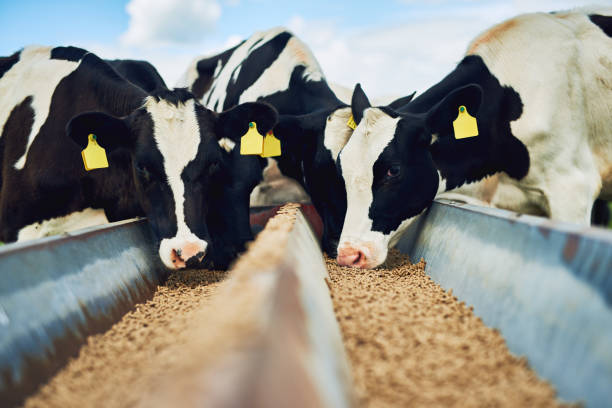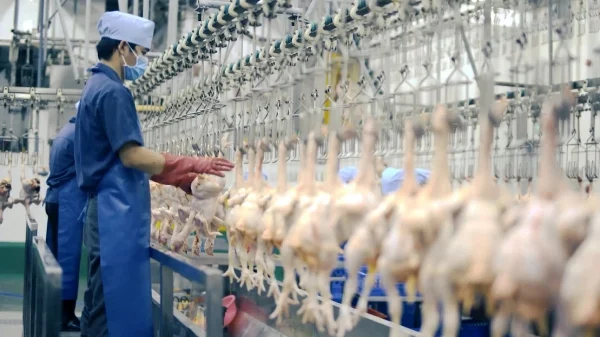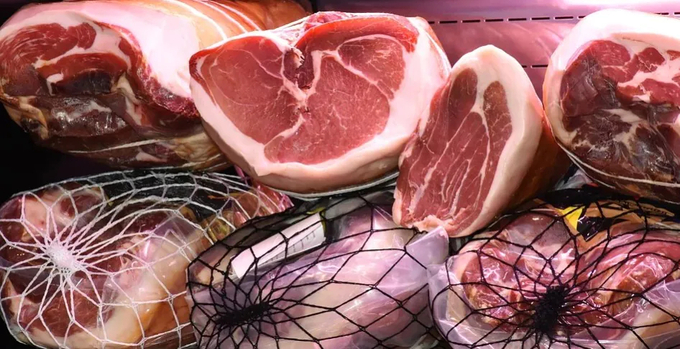June 21, 2025 | 02:50 GMT +7
June 21, 2025 | 02:50 GMT +7
Hotline: 0913.378.918
June 21, 2025 | 02:50 GMT +7
Hotline: 0913.378.918
4 associations including: Animal Husbandry Association Of Vietnam, Vietnam Animal Feed Association, Vietnam Large Cattle Breeding Association, Vietnam Poultry Breeding Association, proposed to Prime Minister Pham Minh Chinh, Chairman National Assembly Chairman Vuong Dinh Hue the shortcomings and solutions to overcome difficulties in the livestock industry.
In the proposal, leaders of four major associations in the livestock industry proposed measures to strictly control the massive import of livestock products from abroad to Vietnam to protect domestic production. The reason is that Vietnam's current regulations on importing livestock products still have many loopholes.

The assessment of declaration of conformity for animal feed products and veterinary drugs by current conformity certification organizations is duplicated and overlapping. Photo: HT.
In 2023, the import turnover of livestock products was US$ 3.53 billion, while exports only reached US$ 515,000. In addition to official imports, a large volume of livestock products were imported illegally (smuggled). According to reports from authorities and media, in 2023 and the first weeks of 2024, 6,000 - 8,000 pigs (weight 100 - 120 kg/head) are smuggled into Vietnam every day, not to mention a large number of buffaloes, cows, discarded chickens, chicken breeds...
Massively importing livestock products into Vietnam is a serious problem, causing many risks, consequences, and the spread of diseases, especially dangerous diseases such as African swine fever and avian flu and lumpy dermatitis on cattle...
Representatives of 4 livestock associations and associations affirmed that imported livestock products are causing unfair competitive pressure with domestic livestock products. Because livestock products currently imported through official quotas are mostly secondary products that are rarely used as food in other countries, such as heads, wings, hearts, kidneys, gizzards, laying hens and waste dairy cows. Not to mention that these are almost expired foods, so they are very cheap, only 50% of the price of domestic products when imported.
In addition, imported livestock products pose a major risk to food quality and safety for consumers, especially in collective kitchen areas for students, workers, etc., users of most of these imported frozen foods.
According to representatives of associations, massively imported livestock products are losing investment opportunities and motivation for domestic businesses and livestock farmers, which will directly affect the problem in national food security.
According to representatives of associations and societies, with the current import rate, in just 3-5 years, Vietnam will become a super importer of livestock products. Therefore, the State needs policies and time for domestic livestock farmers and businesses to adapt.

Associations recommend not charging value-added tax on livestock products that are in pre-processed and preserved form. Photo: HT.
Recommendation from the presidents of 4 associations to the Prime Minister to direct the National Steering Committee to prevent smuggling, trade fraud and counterfeit goods and the ministries: Agriculture and Rural Development; Industry and Trade; Science and Technology; Police; The military has strengthened inspection measures and strictly controlled the import of livestock products.
Regarding official imports, four associations and associations recommend urgently building technical barriers and trade policies to minimize official imports of livestock products.
Among them are the issues of strengthening quarantine measures, quality inspection, and minimizing the number of border gates allowed to import live livestock into Vietnam, as is typically experienced by countries such as America, China, Thailand, Japan, Korea... have done it very effectively.
Specifically, these countries have requirements for cold heat treatment with complex technology and high costs, or on average, each country only allows 3-5 border gates by land, sea, and air to import live livestock. Meanwhile, Vietnam has over 30 border gates of all kinds that are allowed to import live livestock.

Massively importing livestock products into our country is a severe problem, causing many risks and consequences. Photo: HT.
It can be said that compared to countries with developed livestock farming, our country's regulations on importing livestock products are not strict and have many loopholes. Meanwhile, we must endure many strict technical barriers in importing countries to export poultry meat and eggs, making our livestock products weak and disadvantaged.
Representatives of 4 associations proposed to ban all forms of unofficial import and use of imported livestock and livestock products in this form.
Because currently, domestic livestock production basically meets domestic consumption needs. In addition, Vietnam has a long border and the surrounding countries do not have good veterinary work and disease control. Without drastic measures to control the issue of smuggled livestock and livestock products, Vietnam cannot control epidemics and domestic livestock production, as the experiences of China and Thailand have done successfully.
Translated by Tuan Huy

(VAN) The waste of resources from agricultural by-products and the situation of counterfeit and poor quality goods in production causing losses of thousands of billions were pointed out by the National Assembly deputy.

(VAN) After 5 years of implementation, the CAI initiative has helped coffee growers change their farming practices, moving toward responsible agriculture that meets global export standards.

(VAN) The primary prerequisite for the comprehensive and robust integration of Vietnam's livestock sector into the global value chain is the establishment of a disease control system.

(VAN) The results of national programs are essential for establishing a contemporary livestock sector that is well-equipped to meet the demands of both domestic and international markets, with robust biosafety standards.

(VAN) The UNESCO Global Geopark revalidation of Non nuoc Cao Bang and the transition to a two-tier administrative model are presently undergoing a pivotal moment in Cao Bang, the northernmost province of Vietnam.
/2025/06/13/5330-2-004539_953.jpg)
(VAN) Changing policy mindset and removing investment barriers are urgent requirements to open up new development space for enterprises in the agricultural sector.

(VAN) The areas include the restoration of five million hectares of marine ecosystems.